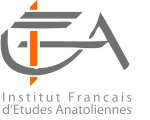19 Ekim 2015 Pazartesi saat 18:00’de IFEA’da
Caroline Finkel (tarihçi, İstanbul), Donna Landry (Kent Üniversitesi), Gerald MacLean (Exeter Üniversitesi)
The Making of the Evliya Çelebi Way
Turkey’s first (and so far only) long-distance equestrian route, the Eviya Çelebi Way, was officially declared open In October 2013, at a ceremony in the historic village of Babasultan on the lower slopes of Uludağ. The Mayor of Bursa Büyükşehir Belediyesi presided, in his capacity as signatory to an agreement to support the route and make it operational.
The EÇW Project began with the aim of re-enacting Evliya’s travels across Ottoman Anatolia, to reconnect people with the Ottoman past and horse culture. In 2009 an international team of academics and equestrian enthusiasts pioneered the EÇW from Hersek (Yalova) to Simav via Iznik, Bursa, Kütahya and Afyon, following Evliya’s 1671 haj route. Equestrian tourists have ridden the route most years since, and hikers and bikers are using it too.
The guidebook to the Way was published in English and Turkish in 2011, the 400th anniversary of Evliya’s birth, and talks about a TV series are currently in progress. The EÇW is managed by the Antalya-based Culture Routes Society, founded in 2012, and is slowly inspiring local communities along its length to develop the route in their area.
An exciting development is the prospect of integration of parts of the EÇW (and also the St Paul Trail and Lycian Way) into an European long-distance route. Under development since 1992, the Via Francegina from Canterbury to Rome is now Europe’s second most famous European Cultural Route. The next stage in its development is to extend it across the Balkans to former Constantinople, from there across Anatolia to Demre on the southern Turkish coast, and thence further east. The CRS is partnering the EAVF (European Association of the Via Francegina) in the Turkish part of this endeavour and hopes to start a pilot project next year.
Our presentation will discuss the cultural aspects of the EÇW, and some of the many complexities of establishing and developing this route.
